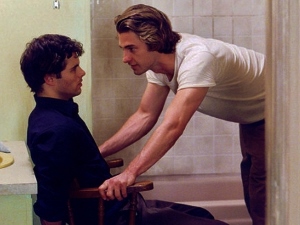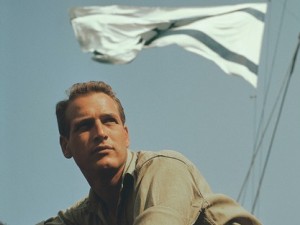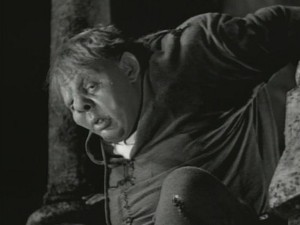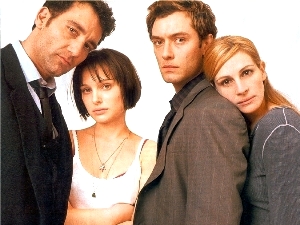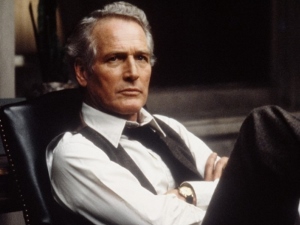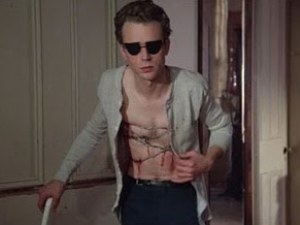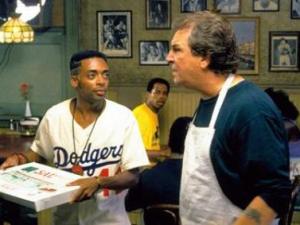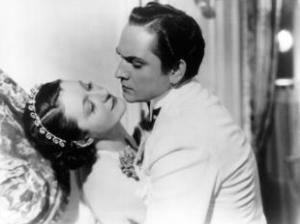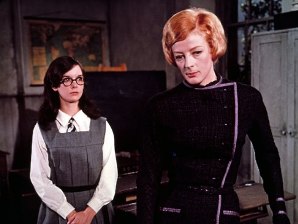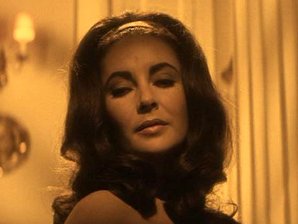Exodus (1960)
The Hunchback of Notre Dame (1939)
[6]
Charles Laughton’s performance as Quasimodo is the main reason to see this movie. Laughton gives the deformed bell ringer moments of quiet torment as well as unbridled joy, and without ever going over the top – a remarkable feat that should have earned him an Oscar nomination. I also liked Cedric Hardwicke as the malevolent Frollo and Maureen O’Hara (in her screen debut) as Esmerelda, but several of the other cast members act as though they are playing cartoon characters (Harry Davenport is the worst offender). The film could have benefited from a more genuine period setting and a more earnest supporting cast. Director William Dieterle bestows the film with some elegance, though it’s not nearly as polished as his later work on The Devil and Daniel Webster.
Closer (2004)
The Verdict (1982)
Wise Blood (1979)
[6]
John Huston tackles Flannery O’Connor’s gothic tale of southern evangelism. Wise Blood is a curious movie full of interesting ideas, not the least of which is a paradoxical main character who shuns Jesus while simultaneously torturing himself for some sort of redemption. Brad Dourif (One Flew Over the Cuckoo’s Nest, Child’s Play) stars as the son of a ‘hellfire and brimstone’ preacher (Huston in flashbacks) who moves to a new city and tries to start up his own church, “The Church Without Jesus.” Preaching on street corners, he easily wins the undying allegiance of a simpleton played by Dan Shor (Tron, Bill and Ted) and makes enemies with rival street preachers (Harry Dean Stanton and Ned Beatty) who only seek to swindle a dollar from faithful onlookers.
Do the Right Thing (1989)
Death Takes a Holiday (1934)
The Prime of Miss Jean Brodie (1969)
[8]
Maggie Smith took home the Best Actress Oscar for her portrayal of Jean Brodie, a charismatic school teacher who dedicates herself to a class of impressionable young women. The film may sound like an all-girl precursor to Dead Poets Society, but it’s a far more nuanced and provocative take on the ‘inspirational teacher’ story. Brodie may begin as the hero of the story, but her tenacious influence and overly-romanticized world view end up having a devastating effect on some of her students. In her (subconscious?) attempt to live vicariously through her “girls,” she ends up creating a monster in her own image.
Reflections in a Golden Eye (1967)
[7]
Director John Huston unites Marlon Brando and Elizabeth Taylor for their only screen pairing in this adaptation of the perverse Carson McCullers novel. Brando plays a sexually repressed Army major who turns a blind eye to his wife’s (Taylor) extramarital affair while simultaneously finding himself drawn to a mysterious young cadet who spends his days running naked through the woods and his nights as a peeping tom. The provocative subject matter is well handled by Huston, whose only missteps are bathing the entire film in a piss-yellow hue and whiplash-inducing camera movement in the film’s final, climactic shot. Good performances from Brando, Taylor, and supporting stars Julie Harris and Robert Forster.

